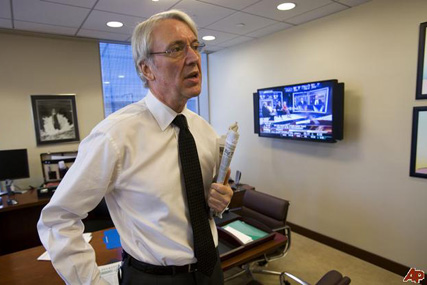
Speaking on the first day of the World Newspaper Congress in Hyderabad, India, Rupert Murdoch’s US leader accused the press of being the "principal architect of its greatest difficulty today".
He told the conference of more than 800 media delegates from 87 countries that those involved in the newspaper business had been "taken-in by the game-changing gospel" of digital evangelists, and asked "how can it be that the internet offered so much promise and so little profit?"
He added: "We are allowing our journalism – billions of dollars worth of it every year – to leak onto the internet. We are surrendering our hard-earned rights to the search engines and aggregators, and the out and out thieves of the digital age.
"It is time to pause and recognise this – free costs too much."
Hinton, who used to oversee News International’s British newspaper operation, including The Times and The Sun, urged the world’s press to "beware of geeks bearing gifts" and said it was time to place a premium back on content.
"Because news costs,"he said. "Because quality costs. Because free sets the price too low. Because free isn’t sustainable. Because free is too expensive."
The chief who has worked for Murdoch both in Australia and the United States and is widely regarded as one of the mogul’s closest allies, questioned the "build it and they will come" philosophy regarding "eyeballs and advertisers".
Using Google’s video site YouTube by way of example, the chief executive said the company that defined viral on the web has had to start paying for quality, professional content [like Channel 4], after discovering not enough advertisers were willing to feature alongside "home videos of pet dogs having baths, or kids doing karaoke in their bedrooms".
"Today, there is one thing we must agree about the content economy – the content economy that they tell us is over," he said.
"That is, the one thing free news sites have in common with online newspapers… the one thing free news sites have in common with online newspapers… virtually none is making money."
Hinton warned that even the advertisers which were initially lured by impressive clicks and page impressions, are now becoming more discriminating.
Drawing on a report called The Silent Click, by Comscore and the Online Publishers Association, Hinton said there was a disconnect between what brand marketers are now asking for in terms of quality measurement online – brand awareness, purchase intent, favourability – versus what publishers have been providing them with – click thrus, unique users and ad impressions.
"Ironically, what they now want is more ‘old media’ metrics they are used to getting from print and television," he said. "It supports what we have been saying all along: that audiences exposed to display advertising on high-quality content sites are more engaged, more favourable towards a brand, and are more likely to spend."
In a call to arms the chief executive of Dow Jones, which owns Wall Street Journal, America’s only major newspaper currently making a profit from charging for content online, called for publishers to find "new and better ways to meet the needs of their viewers, listeners, and readers".
He added: "Let’s face facts. A business model that assumes we can’t charge for the content we produce assumes that our content has no value in the online market.
"In pure economic terms, such a business model has to mean one of two things: Either there is no demand for the content or there are substitute suppliers of that content sufficient to drive the price almost to zero."
Pointing to WSJ’s more than two million paying subscribers, Hinton stated: "I don’t believe it."
Instead, he told publishers to "rationalise the lingering inefficiencies" and to "re-conceive our business in a less costly context".
He concluded: "In the future, good journalism will depend on the ability of a news organisation to attract customers by providing news and information they are willing to pay for.
"Free costs too much. Good content is valuable. That hasn’t changed. It never will. The question is who will provide the content and who will be compensated fairly for the value delivered."



.jpg)


.jpg)